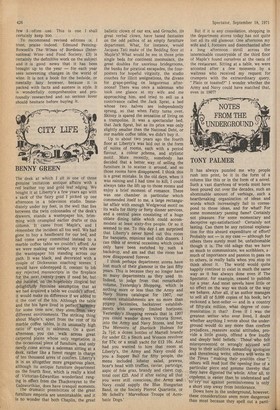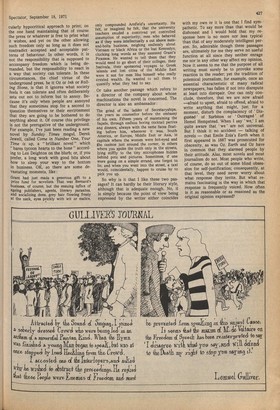TONY PALMER
It has always puzzled me why people rush into print, be it in the form of a column like this or in the form of a novel. Such a vast diarrhoea of words must have been poured out over the decades, such an abominable amount of verbiage, such a heartbreaking organization of ideas and words which increasingly fail to correspond to those ideas, and for what? For some momentary passing fame? Certainly not pleasure. For some momentary and deceptive ego-satisfaction? Certainly not lasting. Can there be any rational explanation for this absurd expenditure of effort? Probably not — in my case — although for others there surely must be, unfathomable though it is. The old adage that we have so much to communicate, we scribblers, s much of importance and passion to pass on to others, is really balls when you stop to think about it. The world would quite happily continue to exist in much the same way as it has always done even if The Spectator, for example, ceased to publish for a year. And most novels have little or no effect on the way we think or the way we behave. After all, if an author manages to sell all of 5,000 copies of his book, he's reckoned a best-seller — and in a country of fifty-six million, what degree of communication it that? Even if I was the greatest writer who ever lived, I doubt whether anything I wrote about the underground would do any more than confirm prejudices, reassure social attitudes, provide a little gossip, offend a few loudly and deeply held beliefs. Those. who felt misrepresented or wrongly aGcused will leap to their solicitors demanding apologies and threatening writs; others will write to the Times "making their position clear "; others will read just the opening line of a particular piece and assume thereby that they have digested the whole. After all, to condemn is easier than to understand and to' cry out against permissiveness is only a short step away from intolerance.
Down here in the underground, however, these considerations seem more dangerous than most because they spell out a parti
cularly hypocritical approach to print; on the one hand maintaining that of course the press or whatever is free to print what it wishes, and yet on the other allowing such freedom only as long as it does not contradict accepted and acceptable patterns of behaviour. In other words, it is not the responsibility that is supposed to accompany freedom which is being demanded, but the responsibility to react in a way that society can tolerate. In these circumstances, the chief virtue of the underground press, be it Oz or Ink or Rolling Stone, is that it ignores what society feels it can tolerate and often deliberately sets out not to inform but to annoy. Because it's only when people are annoyed that they sometimes stop for a second to question themselves or their environment that they are going to be bothered to do anything about it. Of course this privilege is not the prerogative of the underground. For example, I've just been reading a new novel by Sunday Times mogul, Derek Jewell, called Come in Number One, Your Time is up, a "brilliant novel" which "bares tycoon hearts to the bone" according to Len Deighton on the blurb; or, if you prefer, a long work with good bits about how to sleep your way to the bottom in business. OK, so there are some devastating moments, like :
Grant had just made a generous gift to a prize fund for novelists. That was Bernard's business, of course, but the ensuing influx of ageing publishers, agents, literary parasites, and socialising dons, grey hair flowing freely at the neck, eyes prickly with wit or malice, only compounded Arnfield's uncertainty. He felt, or imagined he felt, that the university teachers exuded a contrived yet controlled assumption of superiority; men who behaved as if they were intellectually a cut above nutsand-bolts business, neighing endlessly about Vietnam or black Africa or the lost Kennedys, clucking long words as they assessed Grant's Picassos. He wanted to tell them that they Would need to go short of their colleges, their festivals, their sponsored voyages to Greek islands and lost cities of the Middle East were it not for men like himself who really created wealth. He wanted to tell them to quantify what they had to say.
Or take another passage which refers to a director of the company about whose machinations the novel is concerned. The director is also an ambassador :
The grind of the ladder of Secretaryships, the years as counsellor before the embassy of his own. Fifteen years of maintaining the facade, through endless boring cocktail parties and dinners, always with the same faces floating before him, wherever it was, South America, or Europe, Middle East or Asia, in capitals where the women were hot-eyed and the casinos just around the corner, in others where you spoke the truth only in the streets, lying stiffly to the tiny microphones hidden behind pots and pictures. Sometimes, if one were going on a simple errand, one forgot to lie; and when you went into the street, a taxi would, coincidentally, happen to cruise by to pick you up.
So why is it that I like these two passages? It can hardly be their literary style, although that is adequate enough. No, it is simply because the point of view being expressed by the writer either coincides
with my own or it is one that I find sympathetic. To say more than that would be dishonest and I would hold that my response here is no more nor less typical than that of any moderately intelligent person. So, admirable though these passages are, ultimately for me they serve no useful function at all since they neither enrage me nor in any other way affect my opinion. Now it seems to me that the purpose of all writing must surely be to provoke some reaction in the reader; yet the tradition of polemical journalism, for example, once an essential characteristic of many radical newspapers, has fallen if not into disrepute at least into disrepair. One can only conclude, therefore, that we are now afraid —afraid to upset, afraid to offend, afraid to write anything that might, just for a moment, disturb the complacency of ' Disgusted ' of Surbiton or ' Outraged ' of Hemel Hempstead. When I say 'we,' I am quite aware that 'we ' are not universal. But I think it no accident — talking of novels — that Emile Zola's Earth when it first appeared in 1887 was prosecuted for obscenity, as was Oz. Earth and Oz have in common that they alarmed people by their attitude. Alas, most novels and most journalism do not. Most people who write, of course, do so out of some blind obsession for self-justification; consequently, at that level, they need never worry about what response they invite. But what remains fascinating is the way in which that response is frequently voiced. How often is it as reasonable or as reasoned as the original opinion expressed?



































 Previous page
Previous page